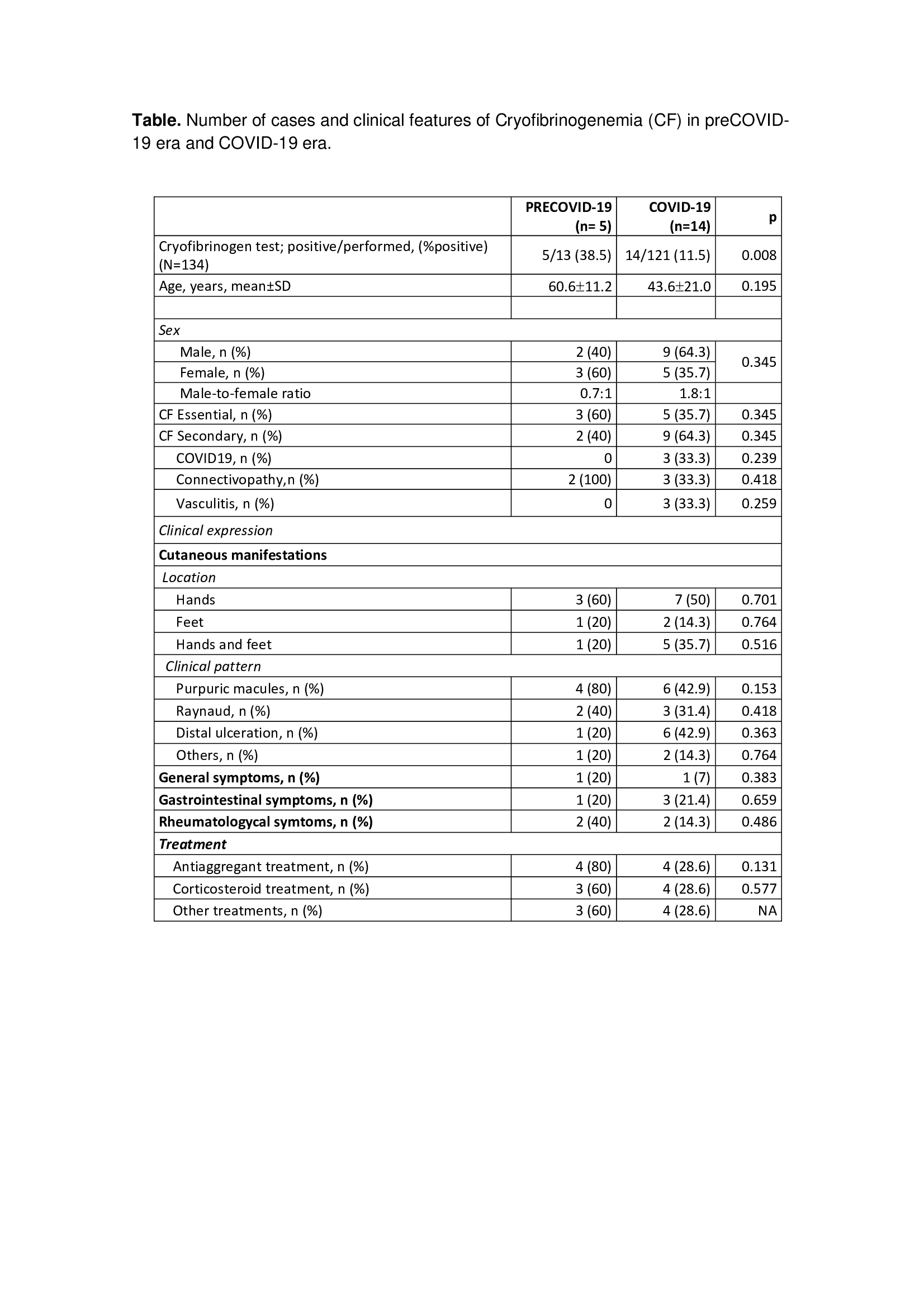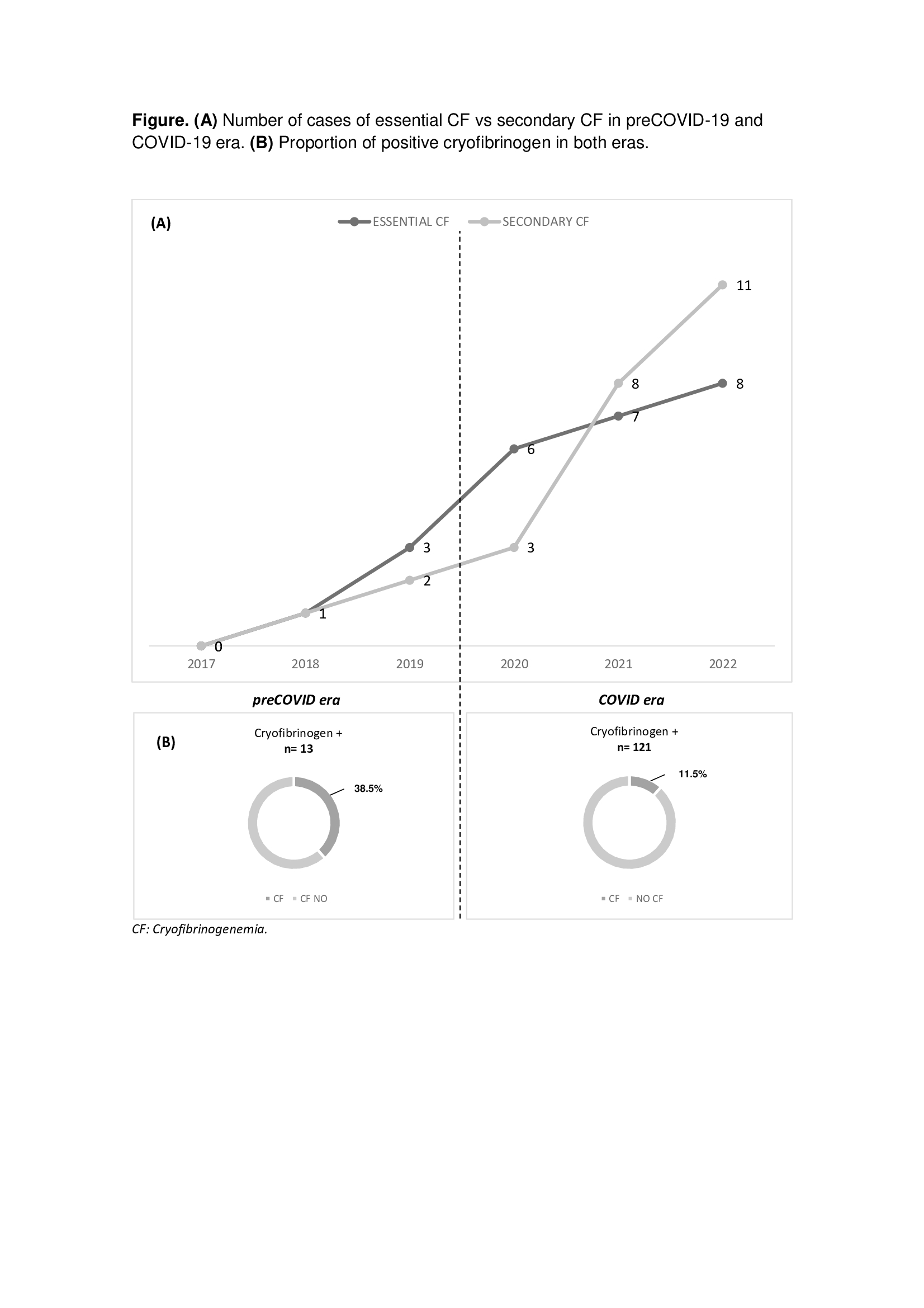Session Information
Date: Monday, November 13, 2023
Title: (1124–1154) Miscellaneous Rheumatic & Inflammatory Diseases Poster II
Session Type: Poster Session B
Session Time: 9:00AM-11:00AM
Background/Purpose: Cryofibrinogenemia (CF) is an under-recognized syndrome due to the lack of definitive criteria and the rarity of disease. CF may be primary (essential) or secondary to autoimmune, neoplastic or infections conditions. Skin manifestations, mainly ulceration, are the most common and may be a pseudovasculitic syndrome. During COVID-19 era the number of cases with skin lesions get increased. Further studies are needed to characterize this association between CF and SARS-CoV-2.
Methods: Observational single-center study in northern Spain University Hospital of 134 patients with at least one positive cryofibrinogen determination, between January 2017 and March 2020 (preCOVID era) and March 2020 and December 2022 (COVID era). CF diagnosis was confirmed accordingly to reported criteria.Clinical conditions, laboratory parameters, including immunological and serological analysis were collected from all patients. Blood was collected in citrated tubes for cryofibrinogen detection. Stadistical analysis was performed using SPSS software. Quantitative variables were expressed as mean±SD. Qualitative variables were compared using the Fisher’s exact test or the chi-squared test, according to sample size. Quantitative variables were compared using the student’s t.
Results: CF was confirmed in 19/134 (14.2%) patients with at least one positive cryofibrinogen test determination (preCOVID-19 era=5; COVID-19 era=14). Patients of COVID-19 era were more frequently male (64.3% vs 40%) and younger (43.6 vs 60.6). Main features are shown in Table 1. We observed a change in the distribution cases. In preCOVID-19 era most of cases were essential CF (60%) and in COVID-19 era most of them were secondary ones (64.3%). The 33.3% of secondary CF were mainly due to COVID-19. Cutaneous manifestations were similar in both subgroups, especially as purpuric macules (perniosis-like) in acral distributions and no significant association was noted between both eras. Antiaggregant drugs and corticosteroids were used more frequently in preCOVID-19 era. The comparative incidence after and before COVID-19 is shown in Figure 1. From patients with positive cryofibrinogen test, a greater proportion in preCOVID-19 had a CF.
Conclusion: CF is a rare disorder with a low prevalence. This study showed the change in the trend of CF subtypes, probably due to the influence of the COVID-19 infection. In COVID-19 era the number of positive cryofibrinogen test had envolved due to SARS-CoV2 infection, CF cases were not increased. Clinical expression of the disease has not changed in both groups.
To cite this abstract in AMA style:
Lasa C, Peiró M, Irure-Ventura J, Sánchez A, Martin-Gutierrez A, secada c, renuncio garcia m, Lopez-Hoyos M, Blanco R. A Comparative Study of Cryofibrinogenemia Before and After COVID-19 Era [abstract]. Arthritis Rheumatol. 2023; 75 (suppl 9). https://acrabstracts.org/abstract/a-comparative-study-of-cryofibrinogenemia-before-and-after-covid-19-era/. Accessed .« Back to ACR Convergence 2023
ACR Meeting Abstracts - https://acrabstracts.org/abstract/a-comparative-study-of-cryofibrinogenemia-before-and-after-covid-19-era/


